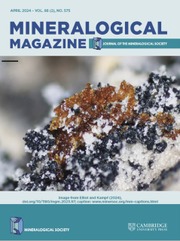Crossref Citations
This article has been cited by the following publications. This list is generated based on data provided by Crossref.
Breskovska, V.
and
Tarkian, M.
1993.
Mineralogy and fluid inclusion study of polymetallic veins in the Madjarovo ore field, Eastern Rhodope, Bulgaria.
Mineralogy and Petrology,
Vol. 49,
Issue. 1-2,
p.
103.
Doussier, Charlotte
Moëlo, Yves
Meerschaut, Alain
Léone, Philippe
and
Guillot-Deudon, Catherine
2008.
Crystal structure of the new compound Pb3+xSb3−xS7−xCl1+x(x∼0.45): The homologous series Pb(2+2N)(Sb,Pb)(2+2N)S(2+2N)(S,Cl)(4+2N)ClN and its polychalcogenide derivatives (N=1–3).
Journal of Solid State Chemistry,
Vol. 181,
Issue. 4,
p.
920.
Roper, Adam J.
Leverett, Peter
Murphy, Timothy D.
and
Williams, Peter A.
2017.
Solubility of the nadorite group minerals: implications for mobility of Sb and Bi in oxidised settings.
Environmental Chemistry,
Vol. 14,
Issue. 4,
p.
224.
Biagioni, Cristian
Bindi, Luca
Momma, Koichi
Miyawaki, Ritsuro
Matsushita, Yoshitaka
and
Moëlo, Yves
2021.
Determination of the Crystal Structure and Redefinition of Tsugaruite, Pb28As15S50Cl, the First Lead-Arsenic Chloro-Sulfosalt.
The Canadian Mineralogist,
Vol. 59,
Issue. 1,
p.
125.
Encheva, Svetlana
Karov, Chavdar
Bilyarska, Teodora
Marinova, Kameliya
and
Metodiev, Lubomir
2024.
On the preservation of mineral type specimens of new mineral species discovered in Bulgaria.
Review of the Bulgarian Geological Society,
Vol. 85,
Issue. 3,
p.
305.


